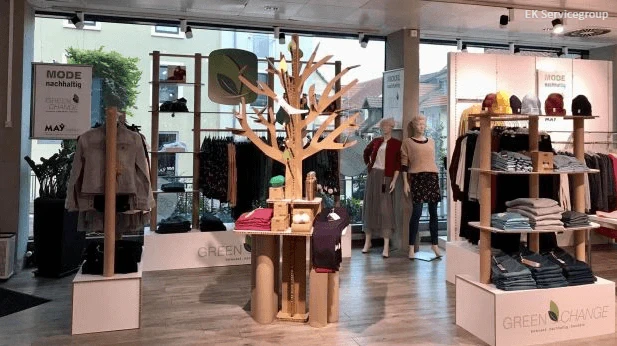KCS News Blog KCS
On June 1, 1932, Ewald Kohlschein founded the 'Ewald Kohlschein - EKA-Plattenfabrik', which has been operating under the name KOHLSCHEIN since 1950.
If you search the internet on the topic of sustainability, Google spits out 52,000,000 German hits. If you delve a little deeper, you realise that the search for innovative concepts and products for environmental protection and resource conservation is in full swing, regardless of whether you are a large corporation, medium-sized company or start-up.
Coca-Cola trialled paper drinks bottles in a market test in Hungary. The cosmetics group L'Oréal developed the first cardboard-based cosmetics tube last year. Paper made from silphia and grass fibres is becoming increasingly fashionable. If the Pebble Printing Group has its way, the publishers of the future will print their books on paper made from stones. Packaging materials made from seaweed, sugar cane, milk or mushrooms are also no longer unusual. Regardless of all the dystopias and actual threats, the topic of sustainability has arrived in the production facilities and laboratories of industry.
And who invented it? No, this time it wasn't the Swiss, but a native of Saxony. Chief Mining Governor Hans Carl von Carlowitz from Freiberg is generally regarded as the creator of the term "sustainability". In his work "Sylvicultura oeconomica" over 300 years ago, he described the principle of sustainable use of raw materials based on forestry. To the credit of our neighbours, Switzerland was the first country in the world to enshrine the concept of sustainability in its constitution.
Ever since the report of the United Nations World Commission on Environment and Development (Brundtland Commission), the term has been a feature in countless climate conferences and national strategies. Right up to the 17 Sustainable Development Goals of the UN 2030 Agenda.
Advertising and sustainability have a complicated relationship. Consumer advocates, for example, repeatedly criticise what is known as greenwashing, which is the misleading portrayal of products as environmentally friendly. Products are labelled as "climate-friendly", "climate-neutral" or "environmentally friendly" using "green rhetoric" - a wonderful term invented by the NRW consumer advice centre - in order to create positive ecological impressions.
The problem is also evident at the point of sale. "No advertising" is not a solution either, as retailers and the hospitality industry know, and it is also accepted by customers whose environmental awareness has been steadily increasing for some time now, and not just in terms of consumption. According to a survey conducted by the Federal Environment Agency in April 2020, 59 per cent of people believe that the climate crisis will have a greater impact on the economy and society in the long term than the coronavirus crisis. The market research institute Facit Research, commissioned by the German Retail Association HDE, has also found in various industry studies that almost 70 per cent of customers now attach importance to the sustainability of products or companies when making purchases. However, the HDE analyses that it is not only customers who are making increasing demands; legislators are also increasingly focusing on ecological and social criteria in environmental, energy and waste legislation. Sustainability is becoming an increasingly important component of a successful business model for retailers.
This is where our company comes into play, as it has long been able to offer the right solutions for these challenges. KOHLSCHEIN has been a leading manufacturer of sustainable, paper fibre-based materials since 1932. Since 1984, our company has also been developing and producing sustainable high quality posters, decorative cubes, stands, counter displays, installations, POS/POP displays, banners, shop window decorations and other 3D constructions for the PoS. This means that the customer receives everything from a single source and can easily trace the origin of the materials, most of which are PEFC™ or FSC® certified. This guarantees that the forestry operations and the processing companies have handled the raw material wood responsibly.
Another advantage:
All our paper fibre-based materials play a crucial role in a sustainable circular economy. They are made from renewable raw materials that are fed back to the recycling loop to create new products. The high-quality materials we use are particularly valuable due to their long fibres, as they can go through the recycling process significantly more often than corrugated cardboard or grey cardboard. Our products therefore do not create waste, but rather high-quality raw material for other recycled products. The fibres can be kept in the recycling cycle for longer, which increases the life cycle of paper fibres within the entire recycling chain many times over and thus protects the environment.
For the user, this means simple, easy and hassle-free disposal in the blue bin with little to no waste disposal costs!
At KOHLSCHEIN, we successfully merge economic needs with ecological priorities, fully in line with the principles of the Green Economy. This approach benefits both future generations and the company's financial health.
Picture: Sustainable, plastic- and metal-free "Green Change" space concept by the retail association EK Servicegroup, which supports the green transition in the fashion industry and fair fashion labels - developed and implemented by Blaupause agency and KOHLSCHEIN.

